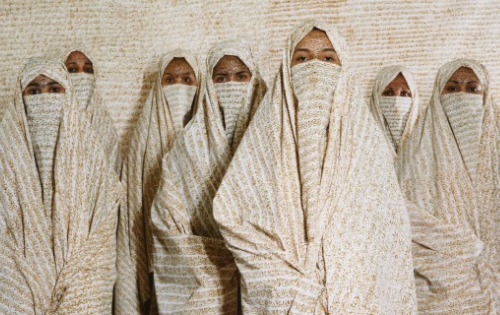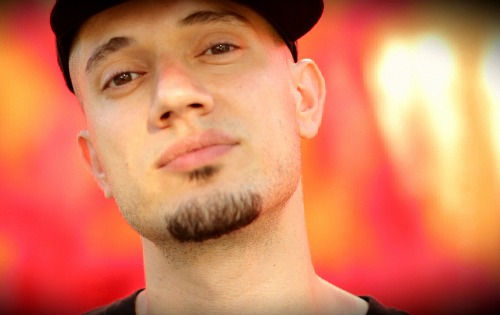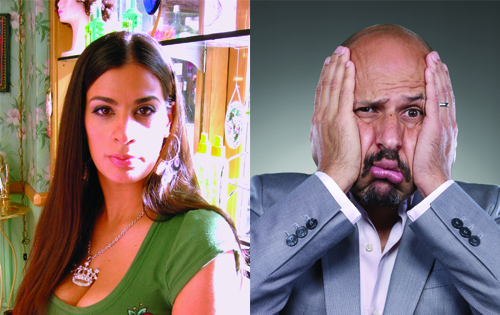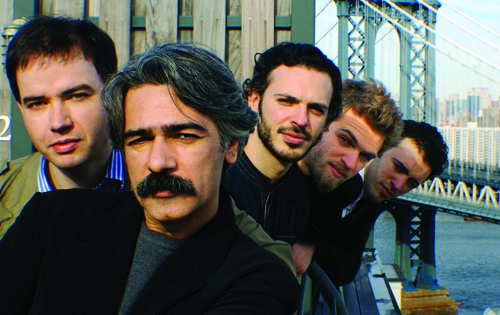The Islamic Worlds Festival aims to promote understanding about Muslim societies in their diverse political, social, religious, historical, and cultural contexts; cultivate civility; and celebrate the cultural traditions practiced in Muslim societies. To program this multi-day series of performances, lectures, and events, numerous cultural student groups shared their ideas and a committed team of Virginia Tech students, faculty, and community members met biweekly for over a year, articulating important themes, researching artists and scholars, and ultimately designing the following week of bridgebuilding experiences:
ISLAMIC WORLDS FESTIVAL TEAM
* Hossein Abtahi,
Iranian Society at Virginia Tech
* Turki Al Zahrani,
Saudi Students Club
* Ali Buhisi,
Students for Peace and Justice in Palestine
* Omar Barkawi,
Students for Peace and Justice in Palestine
* Willie Caldwell,
MFA candidate, arts leadership, School of Performing Arts
* Shamin Dabiri,
Iranian Student Association at Virginia Tech
* Selma Elouardighi,
PhD candidate, planning, governance, and globalization
* Noha Elsherbiny,
Egypt Friends, Council of International Student Organizations
* Nahid Farhady Ghalaty,
Iranian Society at Virginia Tech
* Khaled Hassouna,
associate director, Middle East and North Africa initiatives,
Office of International Research, Education, and Development
* Faruk Hesenjan,
master’s student, urban and regional planning
* Marc Lucht,
director, College of Liberal Arts and Human Sciences
Undergraduate Research Institute
* Afroze Mohammed,
associate director, Strategic Alliances in the Office of Economic Development, Virginia Tech, National Capital Region
* Raghib Qureshi,
Muslim Students Association
* Sana Rauf,
Muslim Students Association
* Ali Roghani,
Iranian Student Association at Virginia Tech
* Mohammed Seyam,
PhD student, Department of Computer Science
* Sara Shashaani, PhD student, School of Industrial Engineering, Purdue University
* Nadine Sinno,
assistant professor of Arabic, Department of Foreign Languages and
Literatures
* Amber Smith,
assistant director, University Honors
* Debra Stoudt,
associate dean, academic policies and procedures, College of Liberal Arts
and Human Sciences
* Anne Elise Thomas,
ethnomusicologist
ISLAMIC WORLDS FESTIVAL SCHEDULE
Program Notes

Thursday, February 12 - Sunday, April 12, 2015
Lalla Essaydi: Converging Territories
Moroccan-born artist Lalla Essaydi’s stunning, large-scale photographs of Arab women confront gender and cultural stereotypes in powerful images that explore female identity through both Arab and Western lenses. In her work, Essaydi explores the power of space—architectural, sociocultural, and the space of the body—and how space is used to define what is woman and, more importantly, to prescribe what woman can and cannot be. Much of Essaydi’s early life in Morocco was defined by traditional laws of gender, in which the female body is a regulated space, existing as both symbol and subject of patriarchal dominance. Essaydi also explores the Western view of the Arab and Muslim world, from the objectifying voyeurism of early Orientalist paintings to current criticisms of and assumptions about “the veil.” On view is a selection of prints from the artist’s acclaimed Converging Territories series (2002–2004). Depicted in these evocative and poetic images are women draped in yards of fabric, with all surfaces, including their skin, covered in calligraphy. Calligraphy, a traditionally masculine art in Arab cultures, is applied in Essaydi’s work using henna, the application of which is a traditionally female practice, the first of many provocative contradictions exposed through Essaydi’s work. Converging Territories highlights tensions between masculine and feminine, objectification and individuality, Eastern and Western ideologies, and opposing ideas of freedom and oppression.
Francis T. Eck Exhibition Corridor
Free
Monday, April 6, 2015, 8 PM
Sacred Geometry in Islamic Art
Douglas K. Lindner, Bradley Department of Electrical and Computer Engineering, Virginia Tech
Islamic Art is well known for its intricate and precise geometric patterns. Less well known is the deep, spiritual meaning carried by the basic geometric symbols behind these patterns. In this talk we will explore the symbolic meaning of the geometric forms that provide the foundation for the patterns in Islamic Art. This exploration will be experiential as well as intellectual. Together we will investigate the deep mysteries presented in simple geometric form. From this symbolic basis we will show how these geometric forms, which carry spiritual meaning in Islam, give rise to the intricate patterns found in Islamic Art. We will also touch on the historical roots of the geometry. Douglas K. Lindner has been a faculty member in Bradley Department of Electrical and Computer Engineering, Virginia Tech, since 1982. His past research interests include control theory and smart materials. In 2013 he organized a conference “Contemplative Practices for a Technological Society” at Virginia Tech. During the last academic year he was the Fredrick Lenz Fellow at Naropa University in Boulder, CO where he developed an interest in the philosophical and metaphysical interpretations of mathematics in antiquity.
Multipurpose Room, Newman Library
Free
Tuesday, April 7, 2015, 10 AM
My Take Talk: Selma Elouardighi
Selma Elouardighi is a PhD candidate in planning, governance, and globalization in the School of Public and International Affairs at Virginia Tech. Born and raised in Morocco, Elouardighi has lived in the United States for the past 15 years, has a deep understanding of both Eastern and Western cultures, and views herself as an ambassador for both. Elouardighi will be discussing the work of Lalla Essaydi. The My Take Talk series invites people from all walks of life to share their "take" on the art in the center's galleries. These short talks provide an inviting space for university faculty, students, and community members to experience exemplary works of art through the lenses of diverse disciplines.
Grand Lobby
Free
Tuesday, April 7, 2015, 8 PM
Islamic Thought and the Emergence of Modernity
Johanna Buisson, assistant professor, École de Gouvernance et d’Économie, Rabat, Morocco; It is commonly assumed that “modernity” emerged in Europe as the outcome of an intellectual, scientific, economic, social, and political process that occurred from the Renaissance to the Enlightenment. However, such a Eurocentric discourse of modernity tends to ignore other, former intellectual, scientific, philosophical, and civilizational contributions, such as the key role of Islamic thought in the making of “Early Modernity.” The dominant historical narrative of “modernity” is indeed being challenged today.
Multipurpose Room, Newman Library
Free
Wednesday, April 8, 2015, 8 PM
Gender Segregation in Islam: A Contemporary Controversy
Johanna Buisson, assistant professor, École de Gouvernance et d’Économie, Rabat, Morocco;
Gender segregation, often termed as the prescriptive prohibition of free-mixing in Islam, is commonly presented as a means of individual and societal protection. Men and women would be commanded by God not to interact or socialize with one another, except for their spouse(s) and respective
mahram
(relatives). This is presented as a necessary prevention against moral corruption at the individual and societal levels. However, such a frightening picture could be misleading with regard to Islamic ethics and how Muslims are expected to behave along the line of the dynamics set by the
Qur’ān
.
Multipurpose Room, Newman Library
Free
Thursday, April 9, 2015, 10 AM
My Take Talk: Marc Lucht
Marc Lucht is director of the College of Liberal Arts and Human Sciences Undergraduate Research Institute (URI), where he oversees the URI's efforts to support student research, supervises the student editors of undergraduate research journal Philologia, and coordinates the College of Liberal Arts and Human Sciences' student exchange program with a school in Morocco. Holding a PhD in philosophy from Emory University, his scholarly work focuses on the philosophy of art and beauty; on moral philosophy, peace studies, phenomenology, and animal rights; and on intercultural dialogue. He has published and delivered numerous conference papers on the moral implications of the aesthetic consciousness, and recently has co-edited two books, one dealing with non-human animals and other creatures in Kafka, and one dealing with group violence. Lucht will be discussing the work of Lalla Essaydi. The My Take Talk series invites people from all walks of life to share their "take" on the art in the center's galleries. These short talks provide an inviting space for university faculty, students, and community members to experience exemplary works of art through the lenses of diverse disciplines.
Grand Lobby
Free
Thursday, April 9, 2015, 6 PM
Student Group Displays
Connect with a variety of Virginia Tech cultural student groups. Presented in collaboration with the Muslim Student Association.
Grand Lobby
Free
Thursday, April 9, 2015, 6:30 PM
Fashion Show
View traditional dress from Muslim societies around the globe. Presented in collaboration with the Muslim Student Association.
Cube
Free

Thursday, April 9, 2015, 8 PM
Omar Offendum
with guests VT Expressions
Omar Offendum is a Syrian-American hip-hop artist, designer, poet, and peace activist. He was born in Saudi Arabia; raised in Washington, D.C.; and now lives in Los Angeles, California. He tours the world performing at international music festivals, lecturing at major academic institutions, and fundraising for humanitarian relief organizations. In 2013 he was a featured speaker at The Nobel Peace Prize Forum in Minneapolis. Offendum has created critically acclaimed songs about the popular democratic uprisings throughout the Middle East and North Africa among other new projects, while touring to promote his solo release SyrianamericanA. Opening the evening’s program is VT Expressions, a student social organization dedicated to free expression in art, music, and poetry, which was created to build a network of artists who exchange ideas, support other progressive programs, and represent the images, voices, sounds, movement, and thoughts of the student body.
Anne and Ellen Fife Theatre, Street and Davis Performance Hall
General admission $25, students with I.D. and children 18 and under $10
Friday, April 10, 2015, 4 PM
The Essence of Uyghur Culture: The 12 Muqam
Uyghurs are a Turkic-Muslim nationality living in the Xinjiang Uyghur autonomous region of Northwestern China. Throughout the history of Central Asia, they left a lasting imprint on both the culture and tradition of the Silk Road. A Muqam is the melody type used in the music of Xinjiang, a musical mode and set of melodic formulas used to guide improvisation and composition. Uyghur Muqam is a composite of songs, dances, and folk and classical music that is characterized by its diversity of content, dance styles, musical morphology, and instruments used. In 2005, the United Nations Organization for Education, Science, and Culture (UNESCO) designated the Uyghur Muqam as part of the Intangible History of Humanity. Join Faruk Hesenjan, graduate student of urban and regional planning at Virginia Tech, for a presentation of this musical tradition.
Cube
Free; registration required through the box office
Friday, April 10, 2015, 5:45 PM
Faculty Panel Discussion
Join Virginia Tech faculty members—Rachel Scott, PhD, associate professor, Islamic studies; Carmen Gitre, PhD, assistant professor, history; and Nadine Sinno, PhD, assistant professor, Arabic, Department of Foreign Languages and Literatures, Virginia Tech—for a cross-disciplinary discussion prompted by the five themes of the Islamic Worlds Festival: What Islam Means to Me, Gender and Islam, Crossing Boundaries, Words, and Colors. This discussion is moderated by Marc Lucht, director, College of Liberal Arts and Human Sciences Undergraduate Research Institute.
Cube
Free; registration required through the box office

Friday, April 10, 2015, 8 PM
An Evening of Comedy: Maysoon Zayid and Maz Jobrani
Laughter and personal observations from two brilliantly funny comedians, as they reflect on culture, families, stereotypes, and building bridges across boundaries: Maysoon Zayid is a Palestinian-American actress, professional standup comedian, writer, and the co-founder/co-executive producer of the New York Arab American Comedy Festival. She is a recurring columnist at The Daily Beast and was a speaker at TEDWomen 2013. Zayid has performed as a comedian in top New York clubs and has toured extensively at home and abroad. She was a headliner on both the Arabs Gone Wild Comedy Tour and The Muslims Are Coming Tour. She is the founder of Maysoon’s Kids, an education and wellness program for disabled and wounded refugee children. Zayid, who has cerebral palsy, was a 2013 honoree of United Cerebral Palsy of NYC’s Women Who Care Awards. Maz Jobrani is a founding member of The Axis of Evil Comedy Tour, which first aired on Comedy Central, and has had two Showtime specials, most recently, I Come in Peace. Born in Tehran, Iranian-American Jobrani performs stand-up around the world, including the Middle East, where he performed in front of the King of Jordan. Most recently, he co-wrote, produced, and starred as the title character in the award-winning indie film comedy, Jimmy Vestvood: Amerikan Hero. He can next be seen (summer 2015) playing the role of Jafar (from Aladdin) in the Disney movie, The Descendants. With more than 50 guest star appearances, Jobrani can regularly be seen on television’s most popular shows, and has been featured on CNN, the BBC, and in The New York Times and Time Magazine. He has given two TED talks on breaking stereotypes through comedy. He is a regular panelist on NPR’s Wait Wait...Don’t Tell Me! He also has a book coming out, I’m Not a Terrorist but I’ve Played One on TV, published by Simon & Schuster, that’s expected to hit shelves in February 2015.
Anne and Ellen Fife Theatre, Street and Davis Performance Hall
General admission $25, students with I.D. and children 18 and under $10
Friday, April 10. 2015, Following the performance
Intercultural Dialogue and Reception
Join us following
An Evening of Comedy: Maysoon Zayid and Maz Jobrani
for hors d’oeuvre from Muslim cultures, social time with other festival-goers, and a chance to delve deeper into the questions and ideas that the Islamic Worlds Festival explores. Capacity is limited; participants will be admitted on a first-come, first-served basis
. Presented in collaboration with Multicultural Programs and Services
Cube
Free
Saturday, April 11, 2015, 10 AM
Yalla Bina! Let's Make Music!
A one-hour workshop introducing instruments, scales, and rhythms of Arabic music, led by Anne Elise Thomas. Learn an Arabic song and dance the Dabke. Families welcome!
Cube
Free; registration required through the box office
Saturday, April 11, 2015, 3 PM
Lecture and Demonstration: Kayhan Kalhor and Brooklyn Rider
Prior to the evening performance, learn about the string instruments in a quartet and kamancheh from a master of the bowed string instrument, Kayhan Kalhor.
Anne and Ellen Fife Theatre, Street and Davis Performance Hall
Free; registration required through the box office
Saturday, April 11, 2015, 6:30 PM
Itraab Ensemble
Join us for the inaugural performance of the Arabic music ensemble, Itraab. Translated as “delectation” or “diversion by music,” Itraab is composed of Virginia Tech students, faculty, staff, and community members and led by Anne Elise Thomas. This 30-minute program includes traditional and contemporary Arabic songs, accompanied by percussion, qanun (78-string zither), `ud (11-string lute), and guitar.
Cube
Free; registration required through the box office

Saturday, April 11, 2015, 8 PM
Kayhan Kalhor and Brooklyn Rider
featuring
Kayhan Kalhor, kamancheh (spiked fiddle)
Johnny Gandelsman, violin
Colin Jacobsen, violin
Nicholas Cords, viola
Eric Jacobsen, cello
This stunning collaboration between Iranian kamancheh virtuoso Kayhan Kalhor and American string quartet Brooklyn Rider has been hailed by the critics as “superbly conceived, organically evolved and wonderfully rich” (Gramophone). Born in Tehran, Iran, Grammy Award-nominated soloist and composer Kayhan Kalhor has toured the world with various ensembles and orchestras, including the New York Philharmonic. He is co-founder of the renowned ensembles Dastan, Ghazal: Persian and Indian Improvisations, and Masters of Persian Music; and is a member of Yo-Yo Ma’s Silk Road Project. Brooklyn Rider also crosses many borders, and their collaborations include programs with Chinese pipa virtuoso Wu Man, Syrian/Armenian visual artist Kevork Mourad, traditional and technology-based Japanese shakuhachi player Kojiro Umezaki, singer/songwriter Christina Courtin, and the Silk Road Ensemble, with whom they have performed throughout the world, recorded three albums for Sony Classical, and taken part in a series of residencies.
Anne and Ellen Fife Theatre, Street and Davis Performance Hall
General admission $25, students with I.D. and children 18 and under $10





